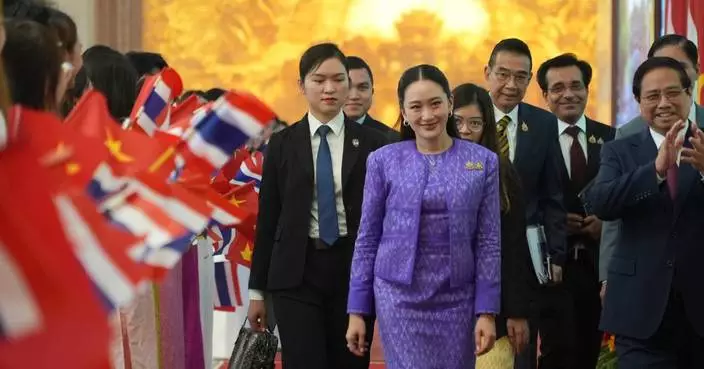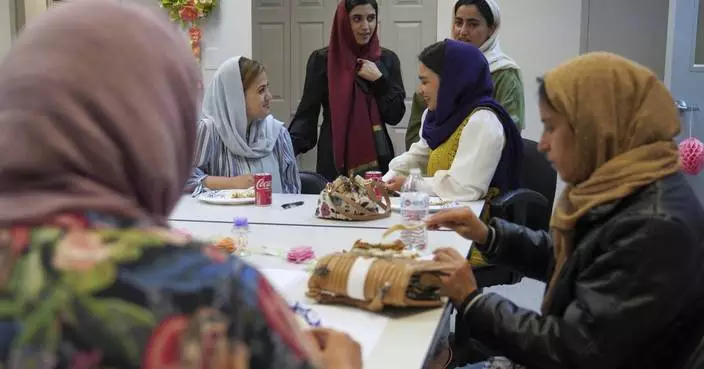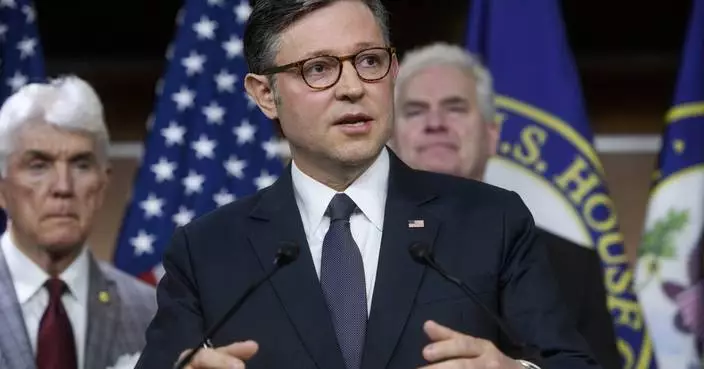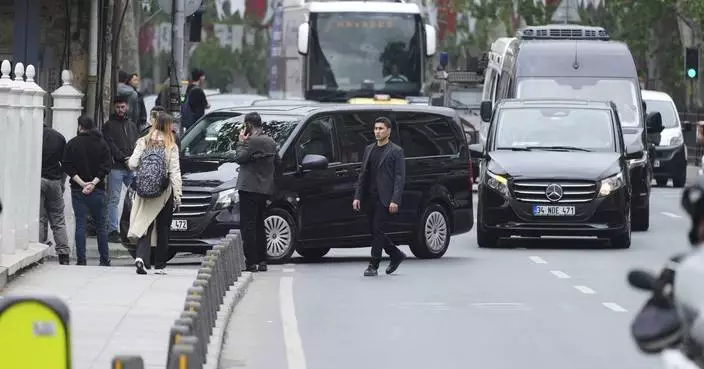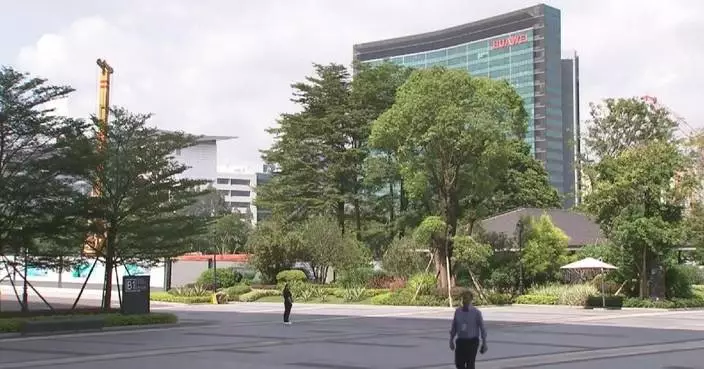NEW YORK (AP) — Ukrainian tennis player Lesia Tsurenko has filed an amended lawsuit that accuses the WTA Tour and its chairman, Steve Simon, of a breach of contract, negligence and the “negligent infliction of emotional distress” because of the way it has handled Russian and Belarusian players amid the war in Ukraine.
Tsurenko, who was once among the world's top 25, claims in the lawsuit that WTA executives — including Simon, who was its CEO at the time — failed to follow through on assurances made in a meeting with Ukrainian players that the organization would ban Russian or Belarussian players who publicly supported the war with Ukraine.
The amended lawsuit, filed Tuesday in federal court for the Southern District of New York, cited examples such as Russian player Veronika Kudermetova wearing a patch at the French Open for sponsor Taneft, a subsidiary of a company that was sanctioned by the European Union for helping to supply the Russian army.
“Despite this promise,” the lawsuit from Tsurenko claims, “neither Defendant Steve Simon nor Defendant WTA banned Russian and Belarus players who publicly supported the war.”
The WTA said in a statement to The Associated Press on Wednesday that it has been “steadfast and clear in its condemnation of Russia’s war on Ukraine and the actions of the Russian government against the Ukrainian people.”
“Consistent with our position," the statement said, "the WTA has taken numerous steps to assist our Ukrainian player members, who have faced great challenges as professional athletes. The WTA has been equally clear that it was founded on principles of equality and non-discrimination and its rules provide that competitions are open to all women players who qualify based on their merit, and without discrimination. Consistent with those principles, and in common with other tennis organizations, the WTA has taken the position that individual athletes should not be penalized for the actions of their governments.”
Shortly after Russia's full-scale invasion of Ukraine in February 2022, the WTA Tour, ATP Tour and International Tennis Federation issued a joint statement in which it said Russian and Belarusian athletes would be allowed to compete as long as they did not compete under their nation’s flags. That policy remains in place with Russian and Belarusian athletes competing at last year’s Paris Olympics as “Individual Neutral Athletes;” Russian players Mirra Andreeva and Diana Shnaider won silver in women’s doubles.
Tsurenko's lawsuit states that she was forced to withdraw from an event at Indian Wells because of a panic attack from having to potentially play against Russians and Belarusians, and that she had “developed excessive stress, loss of concentration affecting her performance at tennis games, mortification and injury to her feelings.”
Lindsay Brandon, the WTA director of safeguarding, informed Tsurenko in 2023 that Simon would be investigated for violating its code of conduct. But that October, the organization informed her that Simon had not violated its code nor any provision of the employee handbook. Tsurenko tried to appeal but was unsuccessful.
“Even in my worst nightmares, I couldn’t imagine that the professional tour, which I considered my home, would become a terrifying and alien place, where the (former) CEO of the organization consciously committed an act of moral abuse against me, leading to a panic attack and my inability to do my job,” Tsurenko wrote Tuesday on social media.
The initial complaint filed in November requests a trial by jury.
Proskaeur Rose, the law firm representing the WTA, filed a motion last month to dismiss the case on the grounds that Tsurenko’s claims were “legally defective.” The WTA has until April 30 to decide whether it will continue with its motion to dismiss.
“While the WTA has the greatest sympathy for the significant challenges that Ms. Tsurenko and our other Ukrainian athletes have faced,” its statement said Wednesday, "we are disappointed that she has decided to engage in litigation to seek to hold the WTA responsible for her distress. At all times, the WTA and its management acted appropriately and in accordance with our rules, and we are confident that we will prevail in this litigation.”
AP tennis: https://apnews.com/hub/tennis

FILE - Lesia Tsurenko of Ukraine plays a forehand return to Aryna Sabalenka of Belarus during their third round match at the Australian Open tennis championships at Melbourne Park, Melbourne, Australia, Jan. 19, 2024. (AP Photo/Asanka Brendon Ratnayake, File)
FREDERICKSBURG, Va. (AP) — The Trump administration’s suspension of the federal refugee program has upended the lives of many Afghans who worked with the United States during wartime.
The upheaval is particularly poignant near Fredericksburg, Virginia, which boasts both strong ties to the military and to resettled Afghans, along with faith communities that serve both groups. The city and its surrounding counties are home to tens of thousands of veterans and active-duty personnel. Virginia also has resettled more Afghan refugees per capita than any other state.
Here are other takeaways from AP’s reporting:
Refugee resettlement work is in peril. As part of President Donald Trump’s immigration crackdown, his administration banned most incoming refugees in January and froze federal funds for the programs. Across the country, resettlement agencies have been forced to lay off staff or close their doors.
Many U.S.-based Afghans are still waiting for family members to join them — hopes that appear on indefinite hold. A subset of Afghans already in the U.S. may soon face deportation as the Trump administration ends their temporary protected status.
Kat Renfroe, the spouse of a retired Marine, supervises the Fredericksburg migration and refugee services office, part of Catholic Charities of the Diocese of Arlington.
“I think it’s tough for military families, especially those who have served, to look back on 20 years and not feel as though there’s some confusion and maybe even some anger about the situation,” Renfroe said.
The U.S. Conference of Catholic Bishops announced in April that it was ending its decades-old partnership with the federal government to resettle refugees. The move came after the Trump administration halted the program’s federal funding, which the bishops’ conference channels to local Catholic Charities.
The Fredericksburg Catholic Charities office has continued aiding current clients and operating without layoffs thanks to its diocese’s support and state funds. But it’s unclear what the future of the local agency will be without federal funding or arriving refugees.
Religious groups have long been at the heart of U.S. refugee resettlement work. Until the recent policy changes, seven out of the 10 national organizations that partnered with the U.S. government to resettle refugees were faith-based. They were aided by hundreds of local affiliates and religious congregations.
Catholic Charities of the Diocese of Arlington has been working with refugees for 50 years, starting with Vietnamese people after the fall of Saigon. For the last 10 years, most of its clients have been Afghans, with an influx arriving in 2021 after the Taliban returned to power.
Area faith groups have been key to helping Afghan newcomers get on their feet. Volunteers from local congregations furnish homes, provide meals and drive families to appointments.
“As a church, we care deeply. As Christians, we care deeply,” said Joi Rogers, who led the Afghan ministry at her Southern Baptist church. “As military, we also just have an obligation to them as people that committed to helping the U.S. in our mission over there.”
Rogers’ husband, Jake, a former Marine, is a pastor at Pillar, a network of 16 Southern Baptist churches that minister to military members. Their flagship location is near Quantico, the Marine base in northern Virginia, where nearly 5,000 Afghans were evacuated to after the fall of Kabul.
With Southern Baptist relief funds, Pillar Church hired Joi Rogers to work part time as a volunteer coordinator in the base’s makeshift refugee camp in 2021. Her position was under the auspices of the U.S. Conference of Catholic Bishops, which the government contracted to help run the camp.
Veterans and members of the military tend to vote Republican. Most Southern Baptists are among Trump’s staunch white evangelical supporters. For those reasons, Pillar founding pastor Colby Garman knows it may be surprising to some that his church network has been steadfast in supporting refugees.
“I totally understand that is the case, but I think that is a bias of just not knowing who we are and what we do,” Garman said after a recent Sunday service.
Jake Rogers said, “We recognize that there are really faithful Christians that could lie on either side of the issue of refugee policy.”
“Regardless of your view on what our national stance should be on this,” he said, “we as Christ followers should have a heart for these people that reflects God’s heart for these people.”
Suraya Qaderi was the last client to arrive at Catholic Charities of the Diocese of Arlington before the U.S. government suspended new arrivals.
She was in Qatar waiting to be cleared for a flight to the United States when the Trump administration started canceling approved travel plans for refugees. “I was one of the lucky last few,” Qaderi said.
She arrived in Virginia on Jan. 24, the day the administration sent stop-work orders to resettlement agencies.
Qaderi worked for the election commission in Afghanistan, and she received a special immigrant visa for her close ties to the U.S. government. She was a child when her father disappeared under the previous Taliban regime.
The return of the Taliban government was like “the end of the world,” she said.
Associated Press religion coverage receives support through the AP’s collaboration with The Conversation US, with funding from Lilly Endowment Inc. The AP is solely responsible for this content.
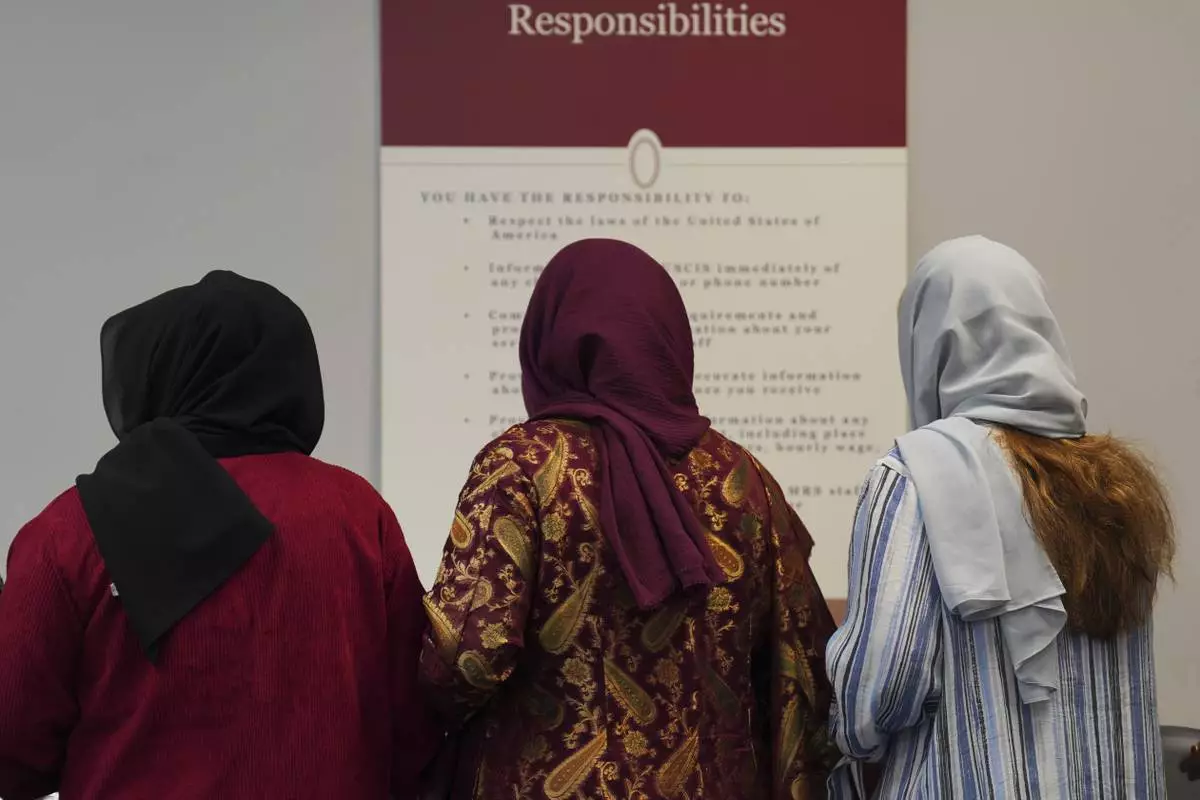
A group of female Afghan refugees gather for a class on self-care and a post-Ramadan celebration at Catholic Charities Migrant and Refugee Services office in Fredericksburg, Va., on Tuesday, April 8, 2025. (AP Photo/Jessie Wardarski)





